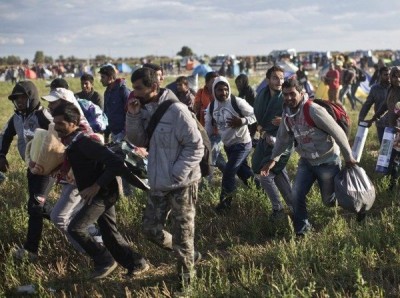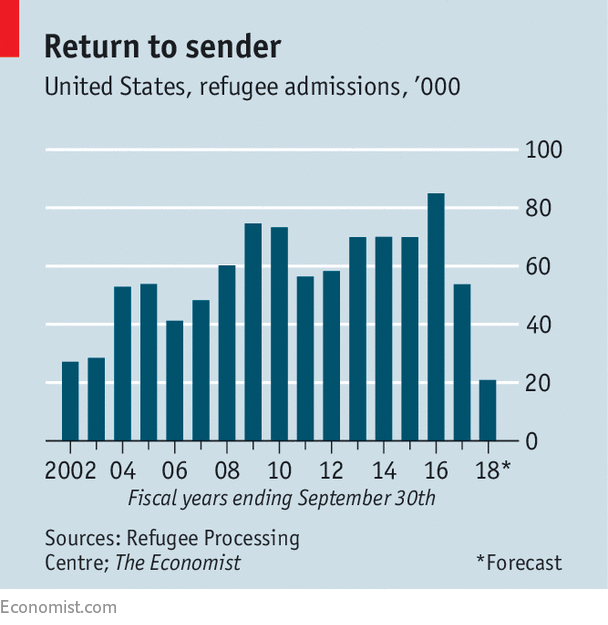War and the Refugee Crisis: The Western Powers Which Bomb Enemy Nations Are Rejecting Their Refugees

The very giants that bomb and reduce alleged enemy nations to rubble are unfortunately the major destinations for the refugees fleeing wars. With the facts behind global aggressions unfolding, the incursions and preemptive strikes under different pretexts are no longer deceptive to the understanding of global observers. Despite the mainstream media scrambles to conceal atrocities committed by warmongers, more protests and outcries are being staged in the corners of the world to criticize the multidimensional harms of the armed conflict.
No external interventionist holds the right to cause the peaceful inhabitants of a jurisdiction to displace, unless it comes forward with legitimate reasons. Syria, Afghanistan and Iraq’s Diaspora worldwide are struggling with the skepticism of the migrant host states over whether they “deserve admission into their societies or not”. By comparison, some European countries as well as Canada, which have no direct involvement in these wars, have welcomed by a far great proportion of the refugees than the US, the UK and France.
In the course of the recent exodus, Germany with 494,227 and Sweden with 111,216 Syrian refugees hit the highest of the list, according to Al-Jazeera. Germany, which is not firmly aligned with the US and the UK in their war of aggression directed against Syria and Iraq, tends to pay “the human price” of the war, whereas Sweden expresses distaste for these costly wars.
Over the past few years, the US has accepted only 18,000 Syrian refugees, less than half of Canada’s 40,000 admissions. In the wake of the deadly terrorist attacks in Paris in 2015, more than half of all US governors issued statements denying Syrian refugees to resettle in their state.
The US, the UK and France defied global pressures and struck Syria with missiles in mid-April in response to a false flag chemical attack. Yet, these three allies are refusing the influx of Syria refugees.
According to The Economist, in 2017 the US admitted 6,557 Syrian refugees, but the number has dropped dramatically in the current year as the US has accepted only 44 Syrian refugees, even as the US-led coalition’s airstrikes and ground raids by the remnants of ISIS still claim lives and spread terror.

Under the UK’s Syrian vulnerable persons resettlement scheme (VPRS) launched in 2014, only around 8,000 people have arrived in the UK by mid-2017. This number is far negligible to other European states’ absorptions as well as potato-small to mayhem created in Syria and elsewhere by the UK and allies.
France, literally third in line to the US-led coalition’s recent bombing of Syria, has received a total of 100,000 asylum applications in 2017, of which only 3,000 applications belonged to Syrian refugees. This week, France approved a tough immigration law that complicates the chance of success of the most vulnerable refugees from war-torn countries. This comes as French President Emmanuel Macron told Fox News TV in an interview on April 22 that France, the US and their allies should stay in Syria after the defeat of ISIS in order to build what he called a “new Syria”.
From 2013 to 2017, Muslims made up 41 per cent of admitted refugees in the US, but more than halfway through the current fiscal year, they now make up just 17 per cent. The declared reason for the decline in admissions is to protect national security through Trump’s policy of “extreme vetting”.
Trump’s “Put America First” program allegedly seeks to protect American workers and industries. In January 26, 2018, Trump released an immigration plan that would offer a 12-year path to citizenship for 1.8 million immigrants who arrived in the country illegally as children.
Trump’s travel ban announced in January 2017 prohibited citizens of Iraq, Iran, Sudan, Somalia, Libya, Yemen and Syria from entering the US. In the middle of the same year, Trump’s travel ban added North Korea and Venezuela. Most of these countries are the victims of direct and indirect US-led interventions.
Last year, in the context of Trump’s ferocious immigration policies, the US announced that visa applicants from seven predominantly Muslim nations, in particular, and other nations, in general, will have to hand over their social media passwords to US embassies as part of their application.
John Kelly, the US Homeland Security Chief said the move was one of several steps aimed to vet immigrants coming to the US. He added that the intention would be to check the web use of US visa applicants to “see what they do on the internet”.
For a citizen of the nation victim of US led war, the reasons are obvious. The US resorts to checking personal accounts of applicants, who are suspected of promoting or at least sharing anti-US posts.
More recently, the world woke up to the dismal news of censorship of Google as well as Facebook’s immoral act of stealing users’ account information to the benefits of global surveillance services. This together with the US visa applicant’s social media screening resonate an eye-opening message to the world followers of facts and truths to be wary of “every act you make”.
Why did the US travel ban not include Afghanistan?
Something which distinguishes Afghanistan from other states is the fact of “secured interests”. Afghanistan is marked as “occupied” which means that “mission is accomplished”.
Apart from the smooth processing of normal visas for Afghan applicants, the US has issued from 15,000 to 20,000 visas for Afghan translators/interpreters under its Special Immigrant Visa (SIV) program. Senator Jeanne Shaheen and Senator John McCain have spearheaded this campaign in the US Congress to approve more visas for Afghan applicants.
The UK and some other states with troops in Afghanistan have also launched parallel programs with limited visas.
As a grim fact, it has to be noted that a powerful state’s humanitarian policies towards a nation heavily hinge upon its military interests there and the former doesn’t tend to act separately from the latter.
To be more precise, Syria or Yemen can enjoy a basket of benefits only when they submit to the diktats of those wage war. Otherwise, they will face a barrage of sanctions. Pakistan, as an example, is set to be placed on a Terror-Financing watch-list from June, simply as retribution for its heated ties with China, i.e. not the real issue of sponsoring terrorism for which it has frequently been rewarded by the US.

